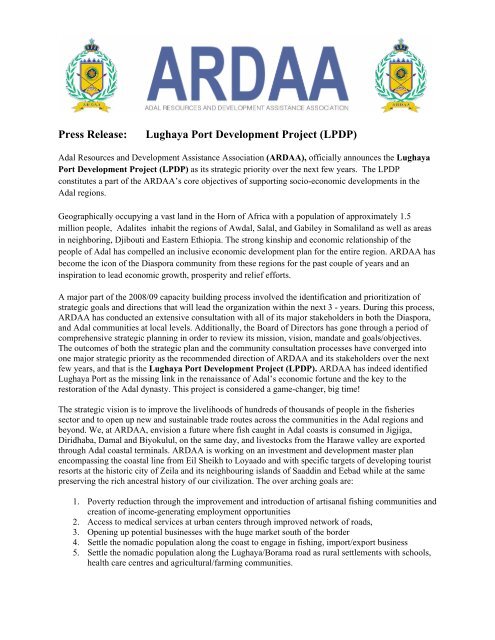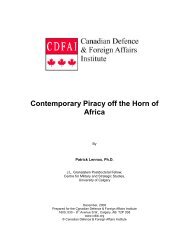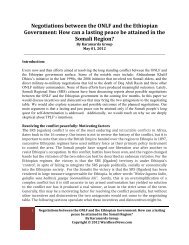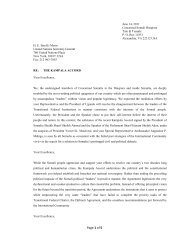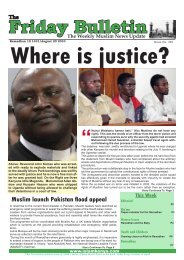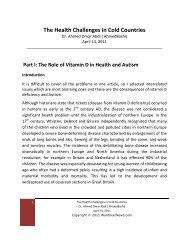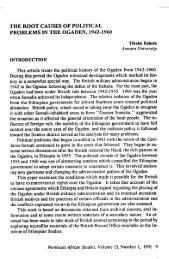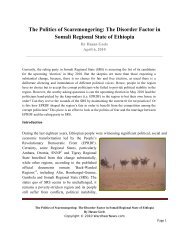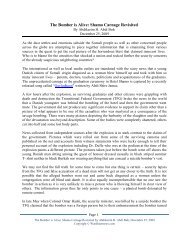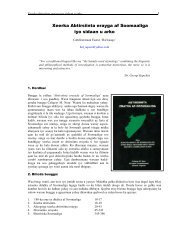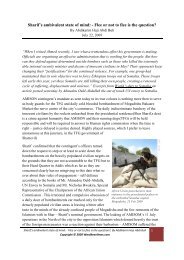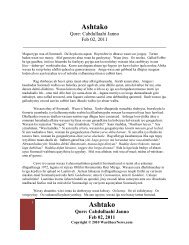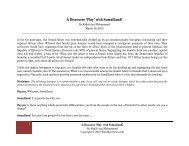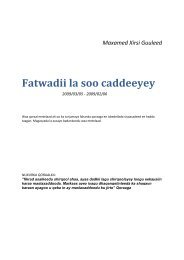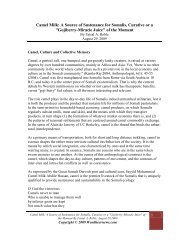Press Release: Lughaya Port Development Project ... - WardheerNews
Press Release: Lughaya Port Development Project ... - WardheerNews
Press Release: Lughaya Port Development Project ... - WardheerNews
Create successful ePaper yourself
Turn your PDF publications into a flip-book with our unique Google optimized e-Paper software.
<strong>Press</strong> <strong>Release</strong>: <strong>Lughaya</strong> <strong>Port</strong> <strong>Development</strong> <strong>Project</strong> (LPDP)<br />
Adal Resources and <strong>Development</strong> Assistance Association (ARDAA), officially announces the <strong>Lughaya</strong><br />
<strong>Port</strong> <strong>Development</strong> <strong>Project</strong> (LPDP) as its strategic priority over the next few years. The LPDP<br />
constitutes a part of the ARDAA’s core objectives of supporting socio-economic developments in the<br />
Adal regions.<br />
Geographically occupying a vast land in the Horn of Africa with a population of approximately 1.5<br />
million people, Adalites inhabit the regions of Awdal, Salal, and Gabiley in Somaliland as well as areas<br />
in neighboring, Djibouti and Eastern Ethiopia. The strong kinship and economic relationship of the<br />
people of Adal has compelled an inclusive economic development plan for the entire region. ARDAA has<br />
become the icon of the Diaspora community from these regions for the past couple of years and an<br />
inspiration to lead economic growth, prosperity and relief efforts.<br />
A major part of the 2008/09 capacity building process involved the identification and prioritization of<br />
strategic goals and directions that will lead the organization within the next 3 - years. During this process,<br />
ARDAA has conducted an extensive consultation with all of its major stakeholders in both the Diaspora,<br />
and Adal communities at local levels. Additionally, the Board of Directors has gone through a period of<br />
comprehensive strategic planning in order to review its mission, vision, mandate and goals/objectives.<br />
The outcomes of both the strategic plan and the community consultation processes have converged into<br />
one major strategic priority as the recommended direction of ARDAA and its stakeholders over the next<br />
few years, and that is the <strong>Lughaya</strong> <strong>Port</strong> <strong>Development</strong> <strong>Project</strong> (LPDP). ARDAA has indeed identified<br />
<strong>Lughaya</strong> <strong>Port</strong> as the missing link in the renaissance of Adal’s economic fortune and the key to the<br />
restoration of the Adal dynasty. This project is considered a game-changer, big time!<br />
The strategic vision is to improve the livelihoods of hundreds of thousands of people in the fisheries<br />
sector and to open up new and sustainable trade routes across the communities in the Adal regions and<br />
beyond. We, at ARDAA, envision a future where fish caught in Adal coasts is consumed in Jigjiga,<br />
Diridhaba, Damal and Biyokulul, on the same day, and livestocks from the Harawe valley are exported<br />
through Adal coastal terminals. ARDAA is working on an investment and development master plan<br />
encompassing the coastal line from Eil Sheikh to Loyaado and with specific targets of developing tourist<br />
resorts at the historic city of Zeila and its neighbouring islands of Saaddin and Eebad while at the same<br />
preserving the rich ancestral history of our civilization. The over arching goals are:<br />
1. Poverty reduction through the improvement and introduction of artisanal fishing communities and<br />
creation of income-generating employment opportunities<br />
2. Access to medical services at urban centers through improved network of roads,<br />
3. Opening up potential businesses with the huge market south of the border<br />
4. Settle the nomadic population along the coast to engage in fishing, import/export business<br />
5. Settle the nomadic population along the <strong>Lughaya</strong>/Borama road as rural settlements with schools,<br />
health care centres and agricultural/farming communities.
These goals, if and when achieved, will eliminate the drastic effect and negative impact of the cyclical<br />
draught, famines, crop failures, trade barriers, poor health system, and community isolation and<br />
dependence.<br />
Adal communities traded with the rest of the world since pre-Islamic era. Zeila was one of the few major<br />
commercial routes and business centres of the whole of the Horn of Africa since time immemorial.<br />
ARDAA is inspired by this history, by the opportunity, by the need for economic independence of the<br />
Adal communities, by the geopolitical realities in the region, and by the location of <strong>Lughaya</strong> as it relates<br />
to its distance from major markets in the Horn. <strong>Lughaya</strong> is currently a government recognized official<br />
port with a central government Customs Office to levy taxes on imports and exports.<br />
In consultation with its major stakeholders, ARDAA wants to have this project delivered in two (2)<br />
phases: Phase I (short-term of 2 – 3 years), and Phase II (long-term – 3 years and beyond). ARDAA’s<br />
short-term strategy for the <strong>Lughaya</strong> <strong>Port</strong> <strong>Development</strong> <strong>Project</strong> (LPDP) is to raise funds, buy/build, and<br />
start-up operations of the port by providing (1) 100 -120 meter Jetty, and (2) medium size floating barge<br />
with a crane. This plan has been recommended by the ARDAA Board of Directors and endorsed by the<br />
elders, authorities and intellectuals of the Adal regions unanimously. Furthermore, the elders, authorities<br />
and community leaders in Somaliland, while endorsing and encouraging this project, took upon<br />
themselves to tackle the other necessary infrastructures, particularly the roads network, locally.<br />
In early spring of 2008, about 54,000 square kilometers of Awdal and Salal regions were devastated by<br />
unusually freezing acid rains and torrential storms. 22 people were killed, 29 villages were destroyed and<br />
141 families lost all of their livestock, which were estimated to exceed 400,000 sheep, goats and camel.<br />
ARDAA, then AACNA, was really tested at its very early stages of formation with the devastation caused<br />
by freezing acid rains. However, the membership and community responded positively and raised close to<br />
US $100,000 in a period of less than a week.<br />
ARDAA Board of Directors coordinated the emergency relief and Diaspora contributions. Over<br />
126 tons of food was distributed to 122,351 people and 1,410 livestock animals were bought and<br />
distributed to the 141 families who lost everything in the 9 villages that were hit hardest by the<br />
natural disaster.<br />
In the aftermath of the freezing acid rains in 2008, and at the conclusion of the highly successful Ottawa<br />
Convention in July 2009, the organization has transitioned itself into a new phase of a comprehensive restructuring<br />
and capacity building process. The goal was to establish strong, transparent, and sustainable<br />
organization with all the generic systems of governance as well as operations in place. This has been<br />
achieved by the empowerment of the grassroots community. Local chapters were formed throughout<br />
North America. These chapters have created a sense of ownership and a general feeling of belonging and<br />
sharing common interest, which energized the base. ARDAA has now become an icon of the community<br />
in the diaspora. It has gone international. The United Arab Emirates (UAE) chapter led the way for the<br />
non-North American participation.<br />
Since the failure of the Somali Nation, Adalites have committed themselves to taking the destiny of<br />
development in their own hands. They have a proven record of accomplishments. They have built high<br />
schools, universities, hospitals, water catch basins and much more. ARDAA would like to congratulate<br />
the efforts and important developmental milestones as well as success stories achieved by our<br />
organizations: Amoud University (first of its kind in the region), IQRA (Gab boarding school), Amoud<br />
Foundation (Al-Hayatt Health Centre), and more recently ASARDA (roads network), and many other<br />
grass-roots agencies. We look forward to working with all our organizations in the very near future and to<br />
celebrating, together, yet another but critically important life changer, the <strong>Lughaya</strong> Seaport.
Current conditions of <strong>Lughaya</strong> port<br />
Proposed short-term <strong>Lughaya</strong> port Equipment<br />
The jetty will be mainly used by the fishing boats on one side. It will also serve commercial on/off<br />
loading on the other side. The jetty must be firm enough to anchor dhows and up to medium-size<br />
commercial boats from the gulf. The floating barge will be the temporary mobile port facility.<br />
Adal Resources and <strong>Development</strong> Assistance Association (ARDAA)<br />
Contact E-mail: info@ardaa.org<br />
May 17, 2010<br />
ARDAA is a non-profit, community-based umbrella organization established in 2007 in North America.<br />
This organization was formed to support socio-economic development projects in the Adal regions, to<br />
coordinate resources and other efforts through fundraising, training, capacity building, and to unite the<br />
community through leadership development, public relations and advocacy.


